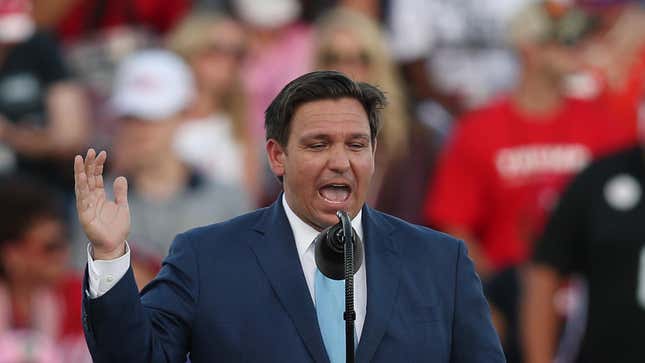
Florida just took a huge step backward in the clean energy revolution. Gov. Ron DeSantis signed a piece of legislation into law earlier this week that requires Florida cities and towns to keep using fossil fuels and could strangle their ability to set clean energy goals and mandates.
The bill, SB 1128/HB 919, is very similar to a slew of other bills that have entered state legislatures over the past year. These pieces of legislation, which have been dubbed “ban the ban” bills, are sponsored by oil and gas interests. They’re part of a flurry of public lobbying and private panic from the industry in response to the growing number of cities moving to ban natural gas hookups in new construction. With its passage, Florida joins Texas, Louisiana, Tennessee, Arizona, and Oklahoma in banning new natural gas hookups in buildings; at least eight other states considered similar bills this year. And, like many of these bills, Florida’s new law has the backing of the state natural gas association and other corporate interests.
“It definitely is following the national trend we’re seeing pushed by the natural gas industry,” said Alissa Jean Schafer, a research and communications specialist at the Energy and Policy Institute who has been tracking the bill.
But Florida’s bill goes a step further than most. The language in the short bill is much broader than its siblings; it says that cities “may not enact or enforce a resolution, ordinance, rule, code, policy, or take any action that restricts or prohibits or has the effect of restricting or prohibiting the types or fuel sources of energy production.” Proponents of the bill say that this language is meant to encourage “energy choice” for Floridians, a term the gas industry has thrown around as it tries to defend against gas bans. But this phrasing, Schafer said, opens the bill up to a lot of interpretation, and could be read as potentially restricting cities from banning fossil fuels altogether.
“Sometimes they introduce broad language and then it gets amended, a finer point put on it, but this pretty much went through as-is,” Schafer said. “It creates a pretty aggressive precedent.”
There are some major cities in Florida with 100% renewable energy targets, including Tallahassee, Gainesville, Orlando, Satellite Beach, Dunedin, Largo, Safety Harbor, St. Petersburg, Sarasota, and South Miami Beach. Even though cities don’t generally have a say in the energy mix their utilities use, these cities, Schaefer explained, are in a unique position to send a signal that they care about where their energy comes from. Now, those signals could be stifled at a time when Florida—and the world—desperately needs to wind down carbon pollution.
“We’re seeing the impacts of climate change already in Florida, so cities are trying to do whatever they can to move the needle,” she said. “They’re using whatever political power they have to say this is the goal. And as cities are making these goals, it sends a signal to the legislators and utilities that this is important.”
But this bill, Schafer said, could extend widely, potentially restricting cities from making changes in areas like energy efficiency codes and building regulations, or from running education campaigns about climate change and clean energy.
“The bill leaves a lot up to interpretation,” she said. “We regularly see utilities fight nonbinding resolutions anyways. Now that this is in their back pocket, is this just going to give them ammo?”
According to Schafer, politicians pushing the bill in the Florida House have said that it wouldn’t be used against local cities, and municipalities looking to set their own energy goals. But she said she sees hypocrisy there.
“To me, it’s very disingenuous to say you can make a goal on the one hand, and on the other hand pass legislation that prevents that goal from being met,” she said. “It’s a slap in the face to local elected officials trying to pass these resolutions.”